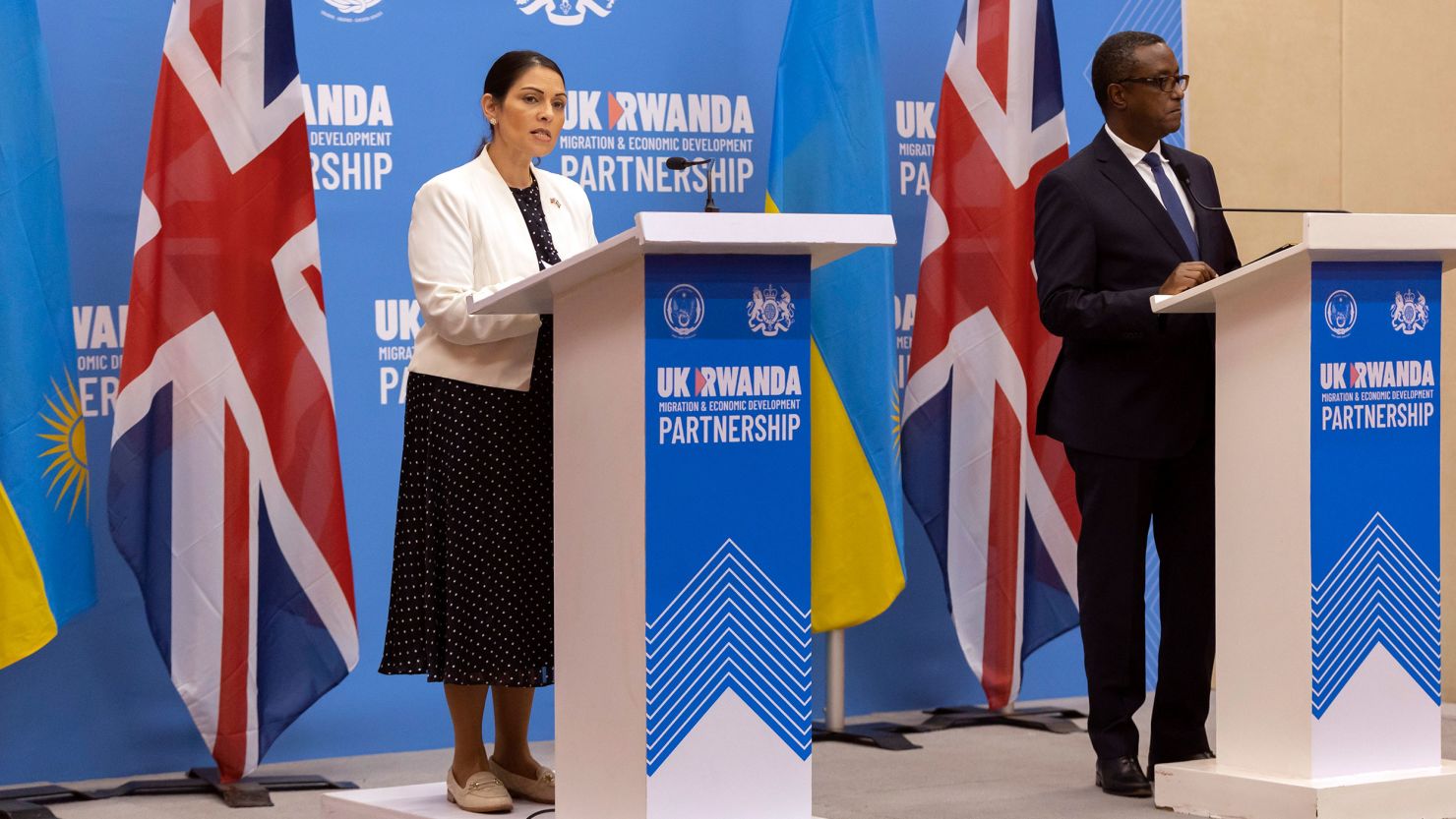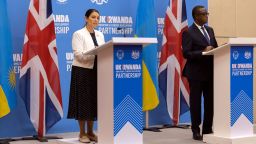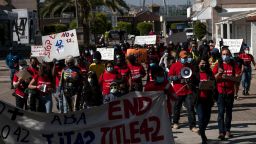Editor’s Note: Sally Hayden is a journalist and the author of “My Fourth Time, We Drowned: Seeking Refuge on the World’s Deadliest Migration Route.” The opinions expressed in this commentary are her own. View more opinion on CNN.
“Hi Sally, long time dear,” came the message. “I am alive, I am in England. Now God protected me.”
It was from an Eritrean man whom I had been in touch with four years earlier. Like a huge number of his countryfolk, he fled a dictatorship known as one of the most repressive in the world, where mandatory and often indefinite military service means young people have little to no freedom.
He risked everything in search of a better life, but like tens of thousands of others, he was intercepted by the Libyan coast guard while trying to cross the Mediterranean Sea – the result of hardening European migration policy.
He ended up spending years between Libyan detention centers, which Pope Francis once called “concentration camps,” and smugglers’ warehouses, where torture and abuse were rife – because he believed it was the only way he could finally find freedom.
This man’s long journey involved corruption and exploitation at every turn, until he finally arrived in the UK. “I am in the home office, waiting for a hotel,” my contact wrote. “It was not only a long journey, it was the worst journey. I lost so much of my mind and I was very hurt but I want to say thanks to God that I am alive.”
He is now one of the tens of thousands of asylum-seekers at risk of being sent thousands of miles away to Rwanda in a new deal that has been widely condemned as cruel, inhumane and even “evil.”
On Thursday, British Prime Minister Boris Johnson announced a plan to send some asylum-seekers who arrive in the UK to live in the East African country. The scheme is initially meant for single men who reach the UK on boats or trucks from France, who could essentially be given a one-way ticket to Rwanda to be processed and possibly granted asylum to stay in the country. It will be ongoing, with the British government investing 120 million pounds ($157 million), and more money to be handed over later.
Over the past few years, I have visited Rwanda to meet refugees who were sent there as part of a separate, European Union-funded scheme inked by the UN Refugee Agency and the African Union, which sees the country used as a transit location for a small number of refugees evacuated from Libya before they are moved to North America or Europe.
I documented some of their stories in my new book, “My Fourth Time, We Drowned: Seeking Refuge on the World’s Deadliest Migration Route.” Through my reporting, I know that Rwanda is a dictatorship with little freedom of speech. Its president, Paul Kagame, has been accused of using refugee deals – with both the African Union and Israel – as a way to maintain good relations with rich donor countries willing to overlook his domestic human rights abuses.
The Rwandan media is heavily controlled, and authorities told me they only granted me accreditation in 2019 because they believed I would write good things about them. Even then, I was not given access to the refugee camp where my sources were staying. This level of censorship shows that there will not be adequate scrutiny over what happens to refugees sent there from the UK.
Refugees I met outside camps were terrified of being overheard by informers, who are known to be omnipresent in Rwandan society. Still, they contacted me at times when they felt they had no other option but to complain about their treatment.
I remember the case of an already badly traumatized minor who said he had escaped a rape attempt by the Rwandan police chief overseeing his camp. We only published our report after the boy had been publicly denounced online by the Rwandan police force without conducting a proper investigation.
Refugees who witnessed what happened said that they were in an abusive, exploitative country once again. In response to my report, a government-associated media outlet accused me of producing “refugee porn.” No further support, that I heard of, was offered to the minor. The police chief kept his job.
Rwanda has long been working with Western public relations firms to rehabilitate its image. Still, human rights abuses there are ongoing. I was in Rwanda, for example, when journalist Cassien Ntamuhanga, who had run afoul of the government, disappeared and later turned up in government custody. He was later accused of communicating with exiled opposition groups, among other charges, and sentenced to 25 years in prison.
Many other citizens have been forced into exile, and the Rwandan government has been accused of ordering the assassinations of opposition figures abroad. Rwanda’s government has consistently denied involvement in attacks on political opponents or critics, according to Human Rights Watch.
The UK deal is still not the first of its kind. Between 2014 and 2017, thousands of asylum-seekers were sent to Rwanda from Israel: They later fled or were tricked into crossing into neighboring Uganda, where they were not granted legal rights.
Part of the UK Prime Minister’s misleading rhetoric is this idea of refugees and asylum-seekers “jumping the queue.” But there is effectively no queue. Last year the British Refugee Council said just 1,587 refugees – the vast majority of them Syrians – were resettled to the UK out of more than 26 million refugees globally.
According to the UN High Commissioner for Refugees, 86% of refugees are currently in developing countries. To make matters worse, refugees I speak to say the limited legal resettlement process is often marred with corruption as well, meaning they have little trust in its validity. The sad reality is that people must enter countries illegally to claim their legal right to international protection there.
Last week, Johnson talked about how the plan to send people to Rwanda is a reaction to the majority of the UK’s boat arrivals being young men, but there is a reason families send men ahead on these journeys – it is because they are so dangerous.
He also spoke about the need to “break the people smugglers’ deadly business model” – the same rhetoric that European politicians have used to justify supporting the Libyan coast guard to conduct interceptions. But if the UK wants to tackle people smugglers, it could go after the smugglers themselves, rather than punishing vulnerable people who are seeking safety.
My book documents the legal trials of significant people smugglers – trials where I was the only international observer, the result of which being that one of the guilty men, who was accused of torture, exploitation and moving thousands of people toward Europe, managed to escape prison.
Over years of reporting, I have to keep asking why huge sums of money are being spent in propping up dictatorships, militias and repressive regimes, securitizing borders instead of improving the lives of people who desperately need help.
Meanwhile, the UK has slashed its aid budget by billions of pounds. In Somalia, where I now am writing, 6 million people are desperately food insecure and 81,000 already thought to be experiencing famine triggered by what experts call the worst drought the country has faced in a decade. More than 300,000 children could die this year, according to the United Nations.
The drought is a result of climate change, mostly caused by rich countries. In 2018, the UK’s emissions were 520 times more than Somalia’s, down from more than 1,000 times back in 2000, according to World Bank data.
Get our free weekly newsletter
Yet foreign aid is woefully inadequate. Among drought-affected communities I spoke to, it was diaspora Somalis – people who had already made dangerous journeys to Europe – who were sending money that could be used to feed those affected.
The British Empire colonized large portions of Africa. The continent’s artifacts continue to be ogled at in British museums. And now the global refugee system is crumbling, and the complacency, or even xenophobia, of British people is allowing it to happen.






